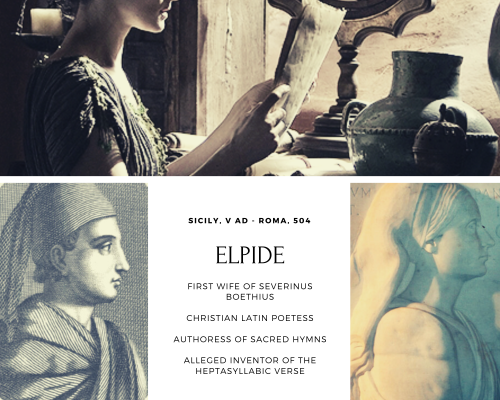#elpide
I was Elpis, daughter of Sicily,
whom the love of the spouse took away from the homeland,
without whom the days were painful, the nights restless, the hours sad,
because we weren’t just one flesh, but also one spirit.From her lost epitaph [my translation]
Elpide(also known as ElpisorElphe) was a Christian Latin poetess born in the V century AD. Her whole life is somehow shrouded in mystery and her whole existence is by some denied. According to tradition, she was the first wife of Roman politician and philosopher Anicius Manlius Severinus Boethius and mother of his sons, Patricius and Hypatius. Nonetheless, according to other academics (if she really existed) she might have married a namesake of the famous philosopher.
Those who context Elpide’s marriage to Severinus Boethius, point out contemporary sources and the fact that same philosopher only talks about his wife Rusticiana, daughter of Roman historian and politician Q. Aurelius Memmius Symmachus, who would give him at least two sons, Flavius BoethiusandFlavius Symmachus. Yet, this doesn’t necessarily disconfirm the existence of another wife. Plus in The Consolation of Philosophy, Boethius writes about fathers-in-law(“Quis non te felicissimum cum tanto splendore socerorum[…]”), fact that would again support the theory of more marriages from his part.
From the first line of her epitaph we learn that she was born, or at least she grew up in Sicily (“Siculae Regionis alumna”). Two cities have since long competing (in heated terms, to the point of almost physically fighting over it in 1819) about the honour of being her birthplace: Messina and Palermo.
The Strait city has a long literary tradition (which goes back to XV century) concerning Elpide’s origins. According to its scholars, Elpide was the daughter of Messinese patrician Titus Annius Placidus and the sister of Faustina, mother of Saint Placidus (one of Saint Benedict of Nursia’s disciples).
Palermo’s academics, on the other hand, dispute the Messinese theory and argue that Elpide was born in Palermo, where she met her future husband who had stayed for a while in that city and, if he took a wife there and then, it would have been more plausible she was a Palermo’s native born. In 1643 a bas-relief portraying Elpide was recovered in Palermo. Since its finder was Messinese Mario Caridi, he managed to have it transferred to Messina, where it was displayed with an annexed plaque which indicated said city as Elpide’s birthplace.
Aside from these geographical controversies, Elpide was described by sources (which, it’s important to point out, are all posthumous) by many as an educated and virtuous woman. An anonymous scholar from Palermo goes as far as suggesting she was the authoress of philosophical works whose authorship was later stolen by her husband.
Two sacred hymns, dedicated to the Saints Peter and Paul and featured in ancient breviaries, are traditionally attributed to her: Felix per Omnes andAurea Lux. Following this attribution, Spanish poet Lopez de Vega considers Elpide the creator of the heptasyllabus verse. These hymns were sung on January 18th and 23rd, February 22nd, June 29th and August 1st.
Elpide died around 504 in Rome, where she had transferred after marrying. She was probably buried in the first St. Peter Basilica, given that her epitaph was said to have been originally placed on the porch of said Basilica.
Boethius would then remarry to the more famous Rusticiana and lead his life as a trusted official at the court of the Ostrogoth King Theodoric the Great, who at that time ruled over a large part of Italy. Later on, he would fall from power and accused of treason, together with his father-in-law, Symmachus. Condemned to death by Theodoric, he would be executed in 524 (or 525) in Pavia (followed by Symmachus the year later). Boethius was then interred in the same city, in the Church of San Pietro in Ciel d’Oro, where Elpide’s epitaph was said to have been transferred, facing her husband’s sepulchre. Nowadays, there’s no trace of such inscription, still many trustworthy antiquaries saw it and wrote down its text, which has arrived to us.
My light hasn’t extinguished, since such a husband still lives,
Sources
- “Via”… da Messina: Elpide, la poetessa dai natali “contesi” tra Messina e Palermo (e Trapani, e Roma)
- Boethius,De Consolatione Philosophiae,book 2, prose 3
- Cicciù Consolato,Personaggi storici messinesi: la poetessa Elpide e l’accesa disputa sul suo luogo di nascita
- Di Giovanni Vincenzo,Filologia e letteratura siciliana studii di Vincenzo di Giovanni Letteratura, vol. 2, p. 324-325
- Mazzucchelli Gianmaria,Gli scrittori d'Italia cioe’ notizie storiche, e critiche intorno alle vite, e agli scritti dei Letterati Italiani, vol. 1, part. 1, p. 1409-1412
- Narbone Alessio,Storia letteraria della Sicilia, Tomo V: Epoca Cristiana, p. 158
- Ortolani Giuseppe Emanuele,Biografia degli uomini illustri della Sicilia, ornata de’ loro rispettivi ritratti, vol. 3, p. 118-123
Post link

